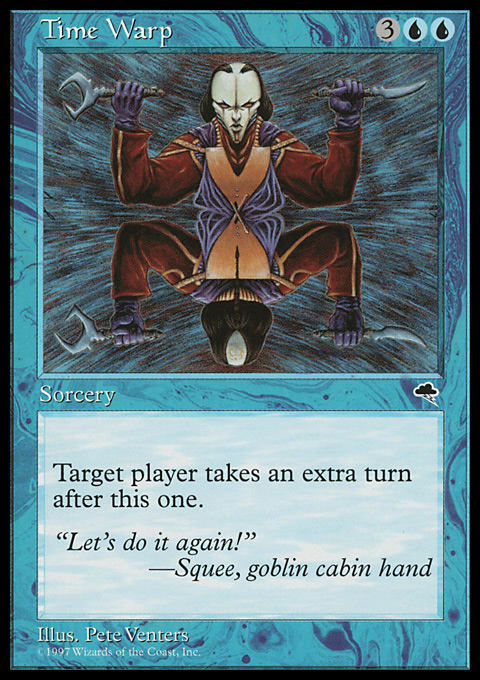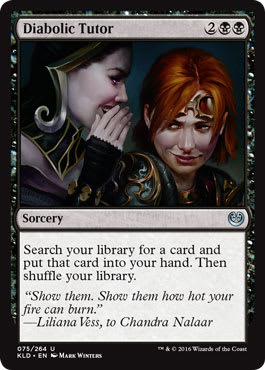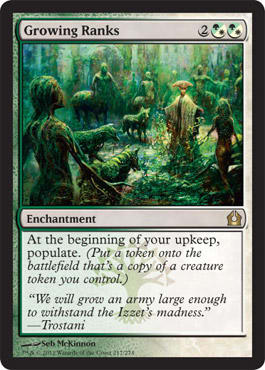Occasionally, I’ve said that how long your turn takes influences how much you’re noticed and therefore targeted. Why, just last week, I wrote about it a little:
I think the point’s worth an article, so here’s that article. And as a double paean to time management, this article will follow its own advice and run short!
Your Turn Isn’t Just Your Turn
In the first couple of turns, each player’s turn takes about the same amount of time as the other turns, so a complete turn cycle has its time equally divided among the players’ turns—you draw a card, you say you’re playing a land, maybe you play a creature, and you pass the turn. For example:
|
||||
| One turn cycle = 100% |
This balance is the metaclock. It’s not about a specific number of minutes; nobody’s paying attention to the clock in that sense. But however long a turn cycle lasts—maybe with newer players it’s longer than with a group of skilled players who have memorized each other’s decks—the metaclock naturally shifts the balance of attention to a few players. My argument is that the balance of attention in a multiplayer board is as important in being targeted as the balance of power.
What happens if I’m playing a deck that draws a lot of cards or shuffles its deck constantly, has to find the right token, or fiddles with +1/+1 counters constantly? The metaclock will shift; for example:
|
||||
| One turn cycle = 100% |
Now, every turn I’m in the game, my opponents are doing two connected things: paying more proportional attention to me and paying less proportional attention to each other. In the metaclock breakdown above, each opponent is spending as much time on you as he is on his other two opponents. It’s not about targeting you at first; it’s just about understanding whatever it is you’re doing, large or small. But the more you’re etched in his brain on your turn, the more you’re etched in his brain on his turn. And if your disproportionate turns were about rattlesnakes or Titans, that’s fine. If it was just about something fiddly, you might be in for a world of hurt. Like a political debate, maybe you pull ahead with all that extra time you took, but you took it from your opponents, giving others more incentive to have a go at you.
Now, what happens if your deck takes quicker turns than everybody else? In the abstract, you give time and therefore attention to your opponents, like so:
|
||||
| One turn cycle: 100% |
And if you’re wondering whether this idea holds up, check the next big game you’re in for signs of it. Are you annoyed at Johnny Weirdcombo for what the combo does, how powerful it is, or that it’s taking five minutes each turn to get there? What about Jane Time Warp? Is it the idea of an extra turn that’s putting your off or how long you’ve sat around waiting for it to matter? In my experience, it’s whined about as power but experienced as boredom, and that boredom is an outgrowth of one player taking the balance of attention.
How to Manipulate the Metaclock
As a strategic consideration, you can influence the metaclock many different ways. I’m either so strategic on this point or so bored with overlong games that I do pretty much all of these, but even if you do only a couple, you might find yourself targeted less over the long haul.
- Express your cards’ abilities cleanly. Explaining your cards isn’t just about knowledge; it’s about keeping opponents from laboring over your deck. I play some lengthy cards, so I have every incentive to develop succinct explanations and therefore reduce suspicion.
- Take as much “free time” as possible. It’s customary in multiplayer to pass your turn before a library search such as with Terramorphic Expanse or Diabolic Tutor. Ostensibly, it’s for courtesy, to keep the game moving. But in this case, courtesy is strategy. If you’re pulling a land out of your deck while someone else’s actions are more important, you just helped yourself out. Quick activated abilities on the last end step before your turn let you run your deck on someone else’s turn without interruption. You might want to consider activating some of those abilities on an end step that isn’t right before your turn; spreading them out means you’re not running an “ad break” between turns.
- Avoid constant reminder decks. I don’t like Howling Mine effects much for several reasons, but one of the big reasons is that I usually have to remind opponents to draw a card. Now, that person has been reminded on his turn that my stuff’s worth noticing. “At the beginning of your upkeep, NOTICE ME!” It’s like someone showing off an engagement ring every other minute—"Cool!", "Yeah!", "We’re quite happy for you!", "We’re tepid for you.", "We get it.", "Now stop." In multiplayer, bling is bad and ninja is good. Very rarely is there a card for which you should do this. Rhystic Study might be a counterexample (see Bruce Richard’s treatise on it), but I’d say it isn’t.
- Go easy on the tokens. I play very few token-based decks, and the metaclock is a big reason. If you’re like I am and insist on producing the token card whenever possible (I carry a binder with every edition of every token from Tenth Edition on), or even if you just need to fumble with dice, tokens take time to mess with, and if you’re making a bunch of them, you might be drawing too much attention to yourself. Not only do you then have more objects on the board than your opponents, you took more time to collect them! That’s fine if you can win with them, but until then, you might be losing with them.
- Go easy on the +1/+1 and other counters. It’s the same idea as with the tokens—if people have to wait for you to find your die, they won’t want to wait to make you die. Gavony Township and especially Ghave, Guru of Spores are prime offenders here. Ghave might fuel metaclock-dominant turns, but often, it’s creating the ad breaks I mentioned earlier, which is about as bad. If you run decks around these cards, you probably ought to build them well enough to stand up to the targeting.
- Be careful with your gazillion-iteration combos. Bloodghast makes Perilous Forays a silly card in Commander. Fecundity makes the combo even better . . . but it also makes it take forever. If your deck absolutely needs that to go off, fine, but if it doesn’t, your free card advantage isn’t as free as you think, since the metaclock exacts its revenge with a bull’s eye.
- Keep playing rattlesnakes. They’re a good idea anyway. But while they defend you on the board, they also defend you against the clock.
If you look back through the decks I’ve included in my column, you’ll find very few that fall afoul of these rules. Let your opponents’ game plans garner attention. Keep your profile naturally low, and the metaclock will favor you.
Conclusion
Often, the balance of attention and the balance of power are the same; the person with a million creatures is probably more dangerous than the person with one, even if that one is Stuffy Doll with an Entangler. But while it’s clear being the most powerful at any given time gets you targeted, it’s less talked about that taking the most time at any given time also gets you targeted. If you pick the plans that pack power without taking forever to access it, you’re better off than your opponents. Metaclock awareness lets you take things that are happening anyway and turn them into an advantage. Ditch the bling. Embrace the ninja.























